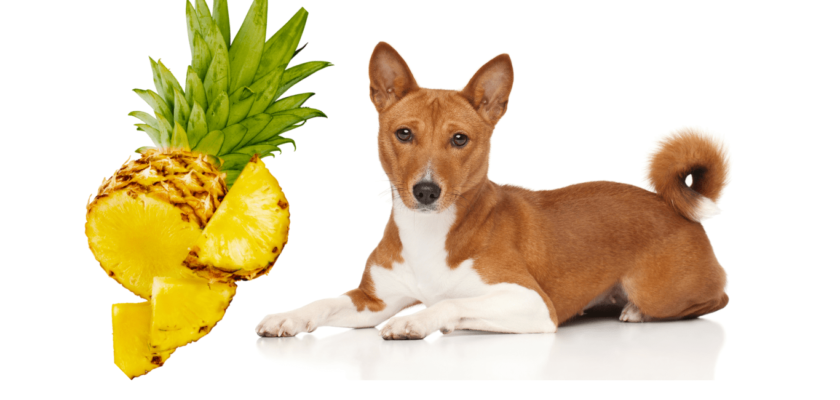Dog Parents, Can Your Pup Enjoy Pineapple Too?
Have you ever been munching on a juicy slice of pineapple and wondered, “Can my dog join in on this tropical treat?” Well, you’re not the only one! Let’s uncover the truth about whether pineapple is a safe and healthy option for your furry companion.
Pineapple is more than just a delicious fruit; it’s a powerhouse of vitamins, minerals, and antioxidants that can enhance your dog’s digestion and strengthen their immune system. Think of it as nature’s superfood for your pup!
But, as with anything, moderation is key. Adding small amounts of fresh pineapple to your dog’s diet can be beneficial, but overdoing it might lead to unwanted surprises.
Why Pineapple is Good for Dogs
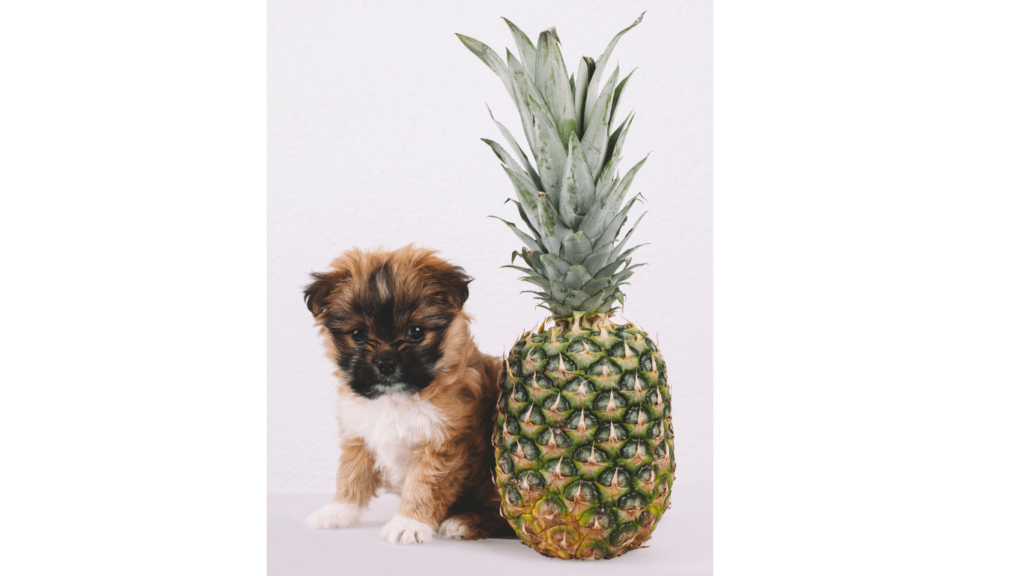
Sure, pineapple tastes amazing, but it’s also packed with essential nutrients that your dog can benefit from.
- Vitamin A: Supports healthy vision for your furry friend.
- Vitamin C: Boosts their immune system, keeping illnesses at bay.
- Vitamin B6: Aids in protein metabolism and helps regulate the nervous system.
A Digestive Friend
Pineapple is high in fiber, which supports a healthy digestive system and ensures regular bowel movements. It’s like a gentle workout for your pup’s gut!
However, too much fiber can cause stomach issues like diarrhea or bloating, so be cautious with portion sizes.
The Power of Bromelain
Pineapple contains bromelain, a natural enzyme that helps break down proteins, making it easier for your dog to digest food. It’s like a digestive superhero in their diet! Including small slices of pineapple occasionally can support your dog’s digestion and provide a tasty burst of vitamins.
Beware of Sugar and Digestive Issues
Even though pineapple is packed with health benefits, it’s also naturally high in sugar. Feeding too much pineapple can upset your dog’s stomach or lead to long-term issues like obesity and diabetes.
Fiber is another double-edged sword. While it aids digestion in moderation, overindulgence can result in discomfort, bloating, or even diarrhea.
How to Serve Pineapple to Your Dog
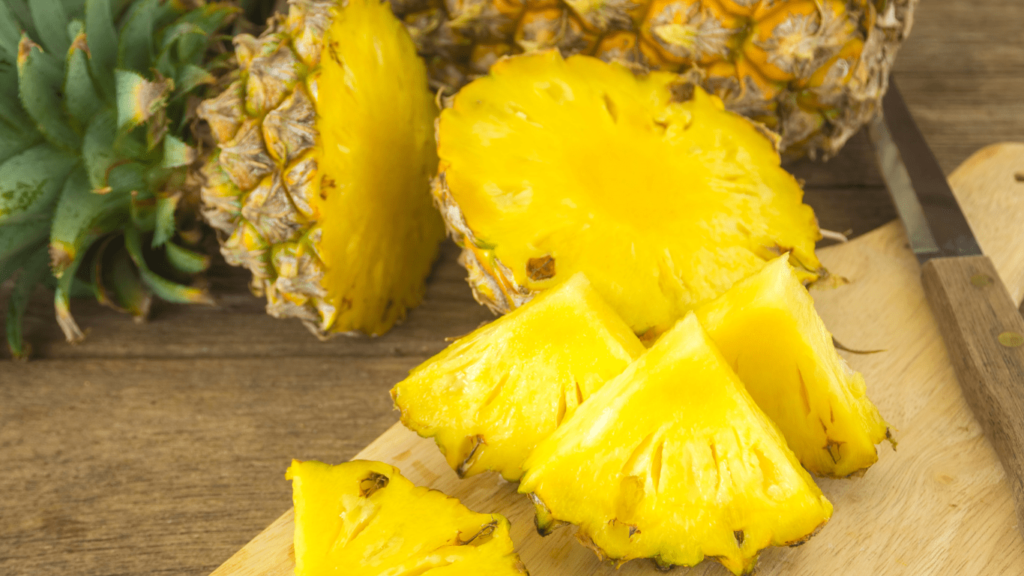
Ready to treat your dog to some pineapple? Preparation is key to ensuring their safety and enjoyment.
- Choose Fresh or Frozen Pineapple: Avoid canned pineapple, which is often loaded with added sugar or preservatives.
- Remove the Skin and Core: The tough skin and core are not only difficult to chew but also hard to digest, posing a choking hazard.
- Cut into Small Pieces: Bite-sized chunks make it easier for your dog to chew and enjoy without a mess.
Portion Sizes Matter
To avoid tummy troubles, follow these general guidelines for serving pineapple:
- Puppies: 1-2 small pieces occasionally.
- Medium-Sized Dogs: 2-4 small pieces as a treat now and then.
- Large Dogs: 4-6 small pieces, still treating pineapple as a snack, not a meal replacement.
Remember, pineapple should complement their balanced diet, not replace it.
Explore Other Fruit Options
While pineapple is an excellent treat, variety is the spice of life! Consider other safe fruits for dogs:
Apples
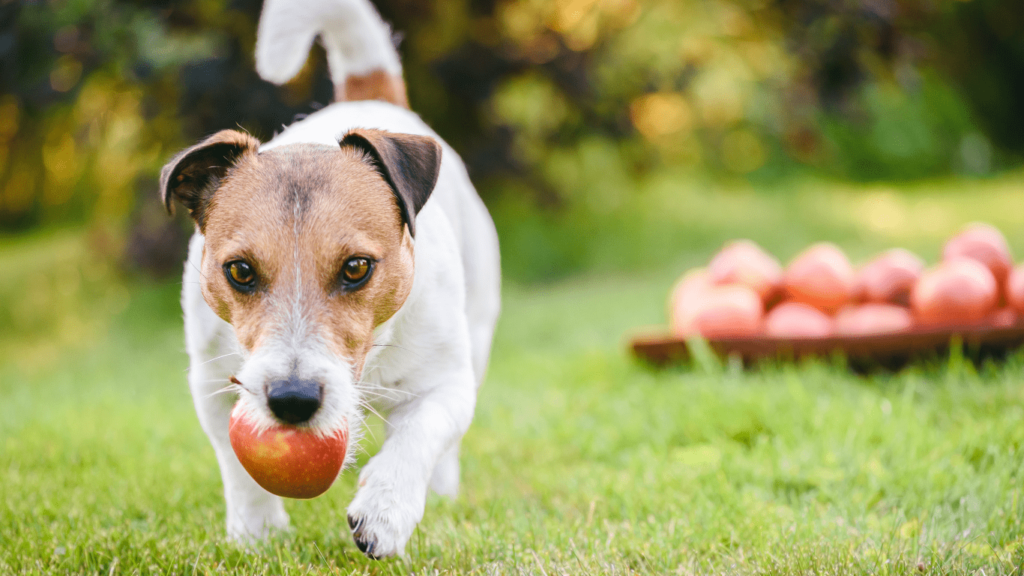
Rich in fiber and vitamins A and C, apples make a great snack. Just be sure to remove the seeds and core, as they can be harmful.
Blueberries – Tiny Treat, Big Benefits
Blueberries may be small, but they pack a powerful punch! These little berries are loaded with antioxidants that support your dog’s overall health. Plus, their low calorie count makes them an ideal snack for pups of all sizes.
Carrots – Crunchy and Healthy
If your dog loves to chew, carrots are a perfect choice. High in fiber and low in calories, this crunchy vegetable doubles as a natural toothbrush, helping to keep your dog’s teeth clean and healthy. Want a nutritious dental treat? Carrots are a go-to option!
Watermelon – Nature’s Hydration Boost
Watermelon is a refreshing snack that’s perfect for keeping your dog hydrated. Packed with vitamins A, C, and potassium, it’s a nutritious choice on hot days. Just remember to remove the seeds and rind to keep things safe for your furry friend.
Pumpkin – A Year-Round Favorite
Pumpkin isn’t just for fall—it’s a year-round superfood for dogs! With its digestive-supporting properties, pureed pumpkin can be a smooth and tasty addition to your pup’s diet. But as with all treats, portion control is essential.
Pro Tip: When introducing new foods, do it gradually. Keep an eye on your dog for any unusual reactions and always serve treats in moderation.
By introducing different fruits, you can keep snack time exciting while ensuring your dog’s health and happiness!
Common Questions About Pineapple Answered
Can dogs eat frozen pineapple?
Absolutely! Frozen pineapple is like a pup-approved popsicle. It’s cold, hydrating, and refreshing on warm days. Just remember, treats like these should always be served sparingly.
How much pineapple should I give my dog?
The amount depends on your dog’s size and dietary needs. A small piece of fresh pineapple is usually fine as an occasional treat, but even large dogs shouldn’t overindulge.
What fruits should dogs avoid?
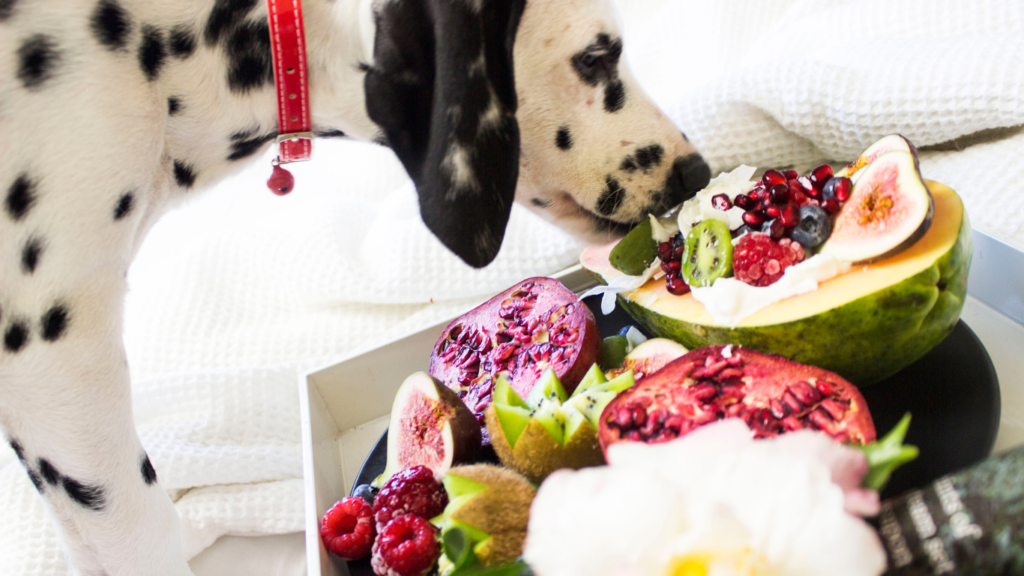
Stay away from grapes, raisins, cherries, and avocados. These fruits can cause severe health problems, like kidney failure or toxic reactions. Always research before offering any new fruit to your dog.
Can pineapple stop dogs from eating poop?
This is a widely shared rumor. Some believe that the enzymes in pineapple make poop taste unappealing, but there’s no scientific proof. If your dog has this habit, consult your vet for advice instead of relying on pineapple.
Wrapping Up – Pineapple for Pups
- Pineapple can be a fantastic, nutritious treat for your dog when given in the right amounts and in its natural form. Think of it as a tropical treat for your four-legged friend!
- This delicious fruit provides immune-boosting and digestive benefits, but avoid canned or processed versions as they’re often packed with added sugars.
- Remember, the key to healthy snacking is moderation. A balanced diet is the best way to keep your dog happy and healthy!
